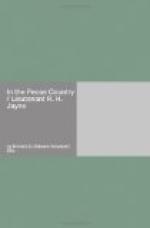It so happened, therefore, as the minutes passed, that something like the renewal of hope came to the heart of the lad, who had reached the conclusion that the subject under discussion did not relate to himself.
This Apache convention did not prolong its session. Lone Wolf seemed to permit his warriors to talk until he became weary, when he said a few words, and the talk ended. During the discussion, numbers had continued to come in, until there were over a hundred gathered together. The moon was shining from a clear sky overhead, and the group gathered on the open prairie, where the members thereof were in readiness to dash in any direction, in case of an attack. With the words of Lone Wolf came the adjournment of the convention. The talk ceased instantly, as if by magic, and the heads of the horses were turned toward the north.
The Indians were about to leave the neighborhood where they had been so roughly used by the whites. A number had already gone, bearing with them the dead and wounded, and the remainder were about to depart—that is, for a time, until their forces could be marshaled into a body that would sweep New Boston from the face of the earth. Such was the decree of Lone Wolf. Was he to permit a party of white men to plant a settlement in the very heart of his country? Was he to allow his hunting grounds to be appropriated in this fashion? Was he to submit quietly to the encroachments of those who had never so much as asked his consent? Not so long as he could summon an army of the best warriors of the Southwest to his command. If his present company had been too small, then he would double and treble it. At all events, the power would be provided to accomplish his purpose.
The horsemen speedily arranged themselves; the head of all turned in a northerly direction. It took some minutes for them to arrange themselves, but they were about ready to receive the command of their chief, when the report of a rifle broke upon the stillness. An Indian, with a spasmodic shriek, threw up his arms and rolled backward, and then from his steed, which snorted and reared, as if it, too, had suffered some injury.




